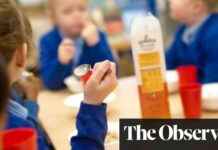Primary schools are facing challenges in helping young children develop their communication skills, as many pandemic-born school starters are struggling to make friends or keep up with lessons due to speech and language difficulties. A recent report by Ofsted highlighted the ongoing impact of the Covid-19 pandemic on children’s behavior and social skills in schools across England.
According to the report, lockdowns have resulted in some children starting reception with delayed communication and language skills, as well as emotional difficulties and poor self-help skills. As a result, schools are having to adjust their curriculum for four-year-olds in reception classes to provide extra support for children with speech, language, and communication difficulties.
Martyn Oliver, Ofsted’s chief inspector, acknowledged that while there has been progress in improving the teaching of early reading and mathematics in primary schools, many children are still playing catch-up on lost learning. He emphasized the importance of ensuring that vulnerable children receive a strong start to their education.
During visits to 20 primary schools, inspectors found that some children in key stage one (ages four to seven) were missing out on foundational knowledge, leading to difficulties in expressing themselves and engaging with lessons. In particular, some year 1 children appeared withdrawn and struggled to participate in classroom discussions or understand their peers.
When asked to write about their weekends or holidays, children with fewer opportunities and experiences at home had little to share, highlighting the disparities in early childhood experiences. Teaching unions have called for additional support for schools to provide specialized help to children at risk of falling behind.
James Bowen from the National Association of Head Teachers emphasized the importance of addressing the lack of preschool experiences and disruptions to early education caused by the pandemic. He criticized the government’s insufficient investment in Covid recovery and the impact on crucial early support services for young children in need of extra assistance.
The report also criticized schools for failing to demonstrate good behavior management to young pupils, noting that children’s behavior deteriorated in environments where they were not taught how to care for toys and equipment. Even play-based learning activities were found to be lacking in promoting problem-solving, collaboration, and persistence among children.
Overall, the report highlights the ongoing challenges faced by pandemic-born school starters in developing communication skills and social interactions. It underscores the need for additional support and resources to ensure that all children receive a strong foundation in their early education, especially those who are most vulnerable and at risk of falling behind their peers.







